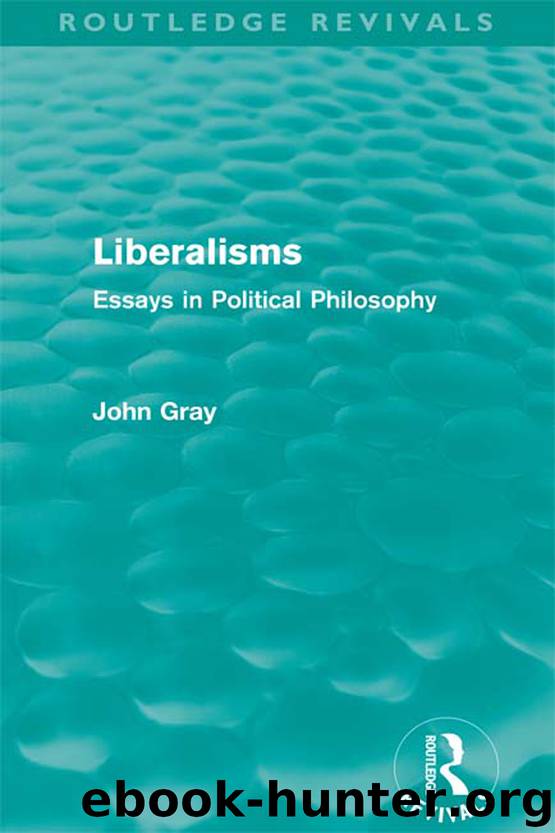Liberalisms (Routledge Revivals) by Gray John;

Author:Gray, John;
Language: ukr
Format: epub
Publisher: Routledge
Concluding remarks
I close this avowedly exploratory paper by mentioning three hard problems for the indirect utilitarian derivation of fundamental rights as I have reconstructed it out of Mill's account of justice. The first problem concerns the strong distinction between the critical and the practical level of moral thought which the indirect view especially marks. It might be objected that this distinction has no peculiar connection with utilitarianism, or at any rate that the connection has yet to be exhibited in detail; there might be a large class of indirect moral theories, in some of which utility appraisals enter at the critical level, while in others it is judgments about rights which occupy that place.19 I take it that Hare's Kantian derivation of utilitarian ethics is intended to answer this difficulty. A different but related point is that a wholly instrumental account of the value of rights, even of the sort given in the indirect view, does not seem to capture our sense of the moral importance of fundamental rights. Perhaps, if we cannot help but see in basic rights considerations which possess an irreducible or ultimate importance, such rights must enter our theory of them at the critical level and have a foundational role in the theory's applications. The most adequate view of rights may not be, and certainly need not be, one in which claims of welfare are always defeated by rights: we might try, as A.K. Sen has done in some recent important work,20 to elaborate a more complex moral structure in which both rights and welfare enter into a consequentialist theory. However this may be, the objection is that it needs to be shown that rights enter moral and political theory always and only as derivations of some more fundamental principle. Against this objection, it may be worth observing that it is not an argument that is neutral in the area of moral epistemology. As Hare has pointed out, arguments of this sort appear to presuppose some sort of intuitionism in our moral knowledge, or at any rate they seem bound to rest content with the deliverances of our moral intuition as to the weight that rights principles are to have in our theory. It may be, however, that this translation of intuitive judgments into moral theory represents a mistake in method.
This last point brings me to what is probably the most fundamental question about the approach explored in this chapter. It may be objected that, in the indirect utilitarian approach, a claim for the primacy of theory over practice in moral life is made which we have no reason to accept. Especially in the indirect utilitarian view it is assumed that the role of theory is to reconstruct our primary moral judgments in a systematic and consistent fashion, and in so doing diminish the incoherences of actual moral life. In the indirect view, more than any other, however, it may be objected that this conception of the primacy of moral theory results in a kind of
Download
This site does not store any files on its server. We only index and link to content provided by other sites. Please contact the content providers to delete copyright contents if any and email us, we'll remove relevant links or contents immediately.
| Anarchism | Communism & Socialism |
| Conservatism & Liberalism | Democracy |
| Fascism | Libertarianism |
| Nationalism | Radicalism |
| Utopian |
The Secret History by Donna Tartt(18152)
The Social Justice Warrior Handbook by Lisa De Pasquale(11950)
Thirteen Reasons Why by Jay Asher(8449)
This Is How You Lose Her by Junot Diaz(6431)
Weapons of Math Destruction by Cathy O'Neil(5825)
Zero to One by Peter Thiel(5487)
Beartown by Fredrik Backman(5349)
The Myth of the Strong Leader by Archie Brown(5236)
The Fire Next Time by James Baldwin(5015)
How Democracies Die by Steven Levitsky & Daniel Ziblatt(4950)
Promise Me, Dad by Joe Biden(4907)
Stone's Rules by Roger Stone(4852)
100 Deadly Skills by Clint Emerson(4686)
A Higher Loyalty: Truth, Lies, and Leadership by James Comey(4546)
Rise and Kill First by Ronen Bergman(4542)
Secrecy World by Jake Bernstein(4387)
The David Icke Guide to the Global Conspiracy (and how to end it) by David Icke(4376)
The Farm by Tom Rob Smith(4320)
The Doomsday Machine by Daniel Ellsberg(4242)
